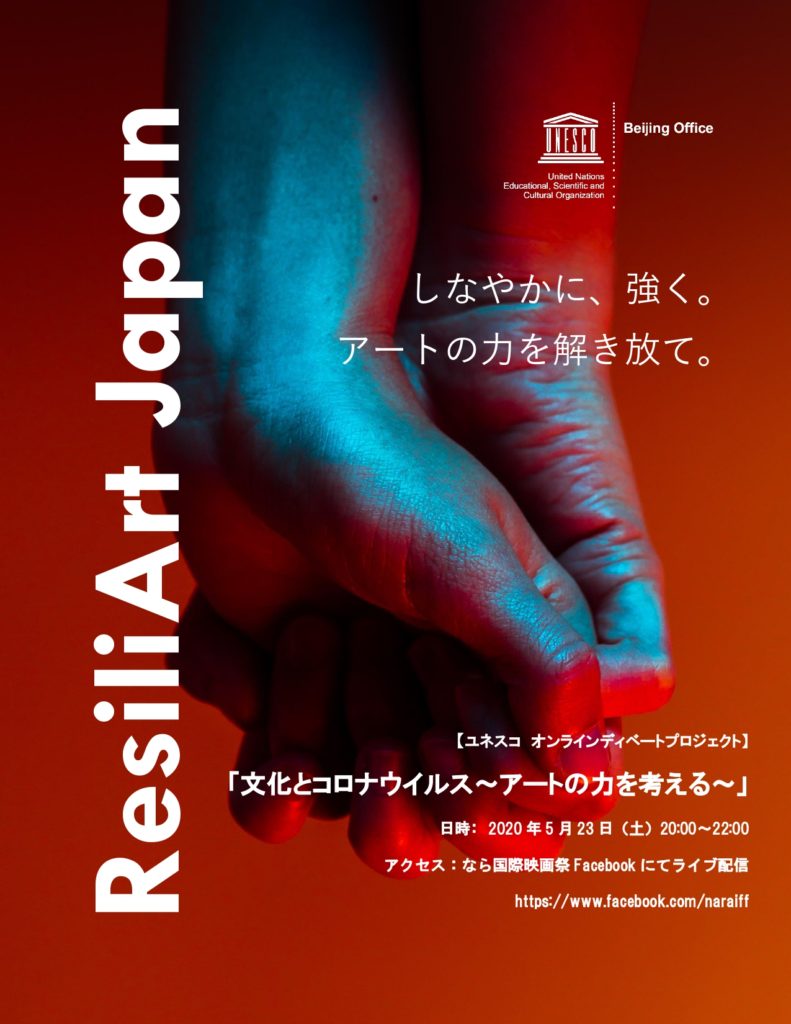◆ Contents ◆
【1】Greeting from Director-General Azoulay
【2】Moving Forward, How Will the Art World Change, and What Should We Do?
【3】Q&A from the Audience
・Methods of supporting artists and their individuality
・A Generation Left Behind
・The Existence of Art ~ To Connect ~
・The Value of Unseen Art (Time for Imagination and Creation
・Comparing the World and Japan
・The Difference Between Professionals and Amateurs
・The Work in Toyooka City (Hyogo Pref.)
【4】Thoughts for Our Children, What Form Will It Take
【5】The Role of a “Cultural Engager”
【6】Final Things That Should Be Conveyed (edited)
On 23 May 2020 from 20:00 to 22:30 (JST), ResiliArt Japan was held to discuss the impact of COVID-19 on the Japanese creative sector. The virtual debate was joined by the following Japanese artists: 1. Naomi Kawase (filmmaker) 2. Oriza Hirata (Playwright, theatre director) 3. Tetsuya Bessho (actor) 4. Miyavi (guitarist) 5. Tomoko Mukaiyama (pianist) In a video message, Audrey Azoulay, Director-General of UNESCO, commented that “ResiliArt provides a platform for artists and cultural professionals to highlight the challenges they face and to discuss potential solutions and collectively imagine a new system for the creative economy after COVID-19.” “To date, I am pleased to announce that 48 ResiliArt debates have been organized in 31 countries, with the enthusiastic and passionate participation of artists and cultural professionals. In addition, 40 debates are still planned. In this context, UNESCO is honored to welcome Japanese creators into this global community of resilient artists.”
During the debate, Mr. Hirata explained the differences between Japan and other countries in terms of cultural policies, roles played by such organizations as arts councils, and stressed the importance of public funding for cultural-related activities such as supporting the diversity of culture.
Mr. Bessho expressed that culture is a “humanity work, for it is culture which makes us humans.” He also stressed that cultural workers are also essential workers and Japan should raise their presence as a “skilled arranger to adapt foreign culture and process.”
Mr. MIYAVI raised a point on how to adapt to the changing world where digitalization and dematerialization are rapidly progressing. As the UNHCR Goodwill Ambassador, he commented that there are various refugee art projects, and that the value of art is being rediscovered. He emphasized the importance of advocacy for arts and culture by calling to “reevaluate and reconstruct value, power and resilience of art and make our voice bigger to be heard.”
Ms. Mukaiyama discussed Dutch cultural policy, which to her is more “user-friendly”, which creates an environment where cultural workers can easily unite to make proposals to the government. She also expressed her views on a sustainable coexistence between people and nature as well as the importance of unity.
Moderator, Ms. Kawase, who is the Director of the Official Film of the Olympics Game Tokyo 2020 (now scheduled 2021) said she has been filming various people including medical staffs and refugee Olympics athletes team, saying “the Olympics should be held by conquering any challenges, we would like us all human beings to enhance each other and seek solutions.” Mr. Bessho responded, “Even if we cannot welcome guests from all over the world to the Olympic stadium, we Japanese cultural workers must put our power together and do something.”
The panelists collectively discussed how important it is for artists and cultural professionals to unite and
propose concrete ideas to the government. They also agreed that there should be more continuous
dialogue between artists and cultural professionals on the one hand and the government on the other, so
as to find solutions to challenges brought about by COVID-19 but also beyond COVID-19.
In closing, UNESCO representative thanked the panelists and audience for their participation and invited
them to continue debates to exchange ideas and seek collective solutions.
Ms. Kawese wrapped up the 2.5 hours of debate by saying “Time of crisis is a chance. We hope our words
could deliver power to the audience and beyond.”
According to Ms. Kawase, 20,000 people accessed the event.
